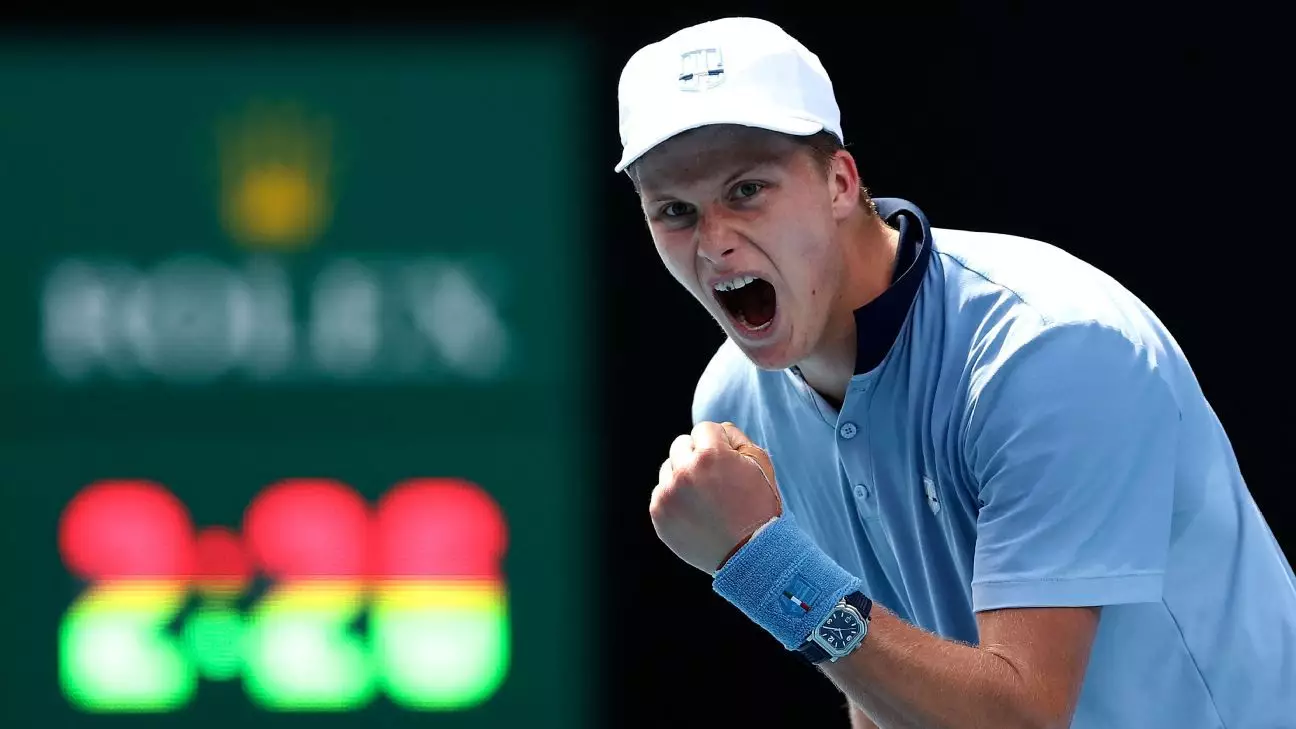At 21, Jenson Brooksby was on the fast track to becoming one of American tennis’s brightest gems. Ranked No. 33 in the world less than a year after turning professional, he was celebrated for his potential and bold performances on the Grand Slam stage. However, a turbulent journey filled with injuries, surgeries, and personal battles culminated in a frustrating two-year absence from the gravitational pull of professional tennis. The world has seen athletes come back from injuries before, but Brooksby’s case intertwines physical afflictions with mental health challenges, particularly as he navigates life with autism spectrum disorder (ASD).
Brooksby’s circumstances highlight a pivotal narrative rarely shared in the competitive sports arena—a tale of resilience colored by vulnerability. Those two years away from the tour were marked by more than just physical ailments; they were laden with emotional turmoil that echoed deeply within him. Brooksby’s candid revelations about his mental health illustrate a broader issue—many athletes bear burdens far beyond the physical, often concealed from the public eye.
In a recent interview, Brooksby broke the silence surrounding his diagnosis of autism, emphasizing the need for transparency about mental health in sports. He reflected on his struggles as a child who was nonverbal until the age of four, spending extensive hours in therapeutic settings to improve his communication skills. This narrative resonates profoundly in a society that often stigmatizes mental health issues, particularly in high-stakes environments like professional sports.
“I don’t want to have to keep [my condition] to myself,” Brooksby revealed, and his willingness to speak openly about ASD marks an important moment for both the athlete and the public. Many athletes feel compelled to project an image of invulnerability, but Brooksby’s honesty about his autism humanizes the athlete and paves the way for other players grappling with similar issues to come forward.
Interestingly, Brooksby describes autism as a “big strength” in pressure moments on the court. While it certainly poses challenges, his unique perspective enables him to zero in on crucial aspects of the game, a quality that can be a competitive advantage. This ability highlights a dual narrative: how an individual can embrace their neurology as a source of strength, while acknowledging its difficulties. His trainers are attuned to his emotional needs, providing valuable support as he re-enters the sport.
Brooksby’s journey has also included a contentious suspension related to missed drug tests—an issue compounded by the nuances of his autism. While the International Tennis Integrity Agency (ITIA) initially imposed an 18-month ban on the young athlete, insights from his trainers helped unveil the complexities surrounding his compliance with testing protocols. The appeal process shed light on how autism impacts decision-making and executive functioning, emphasizing the pressing need for understanding and accommodations within athletic organizations.
The ITIA’s decision to revisit Brooksby’s case based on new information reflects a significant shift toward recognizing the unique challenges faced by athletes with disabilities. The journey from misunderstanding to acknowledgment suggests a growing trend in sports organizations to adopt more empathetic approaches towards athletes who navigate both physical and mental hurdles.
As Brooksby prepares to return to competition in January, he carries with him not only the weight of his experiences but also a rejuvenated perspective. After nearly two years away from the sport, he is set to participate in the Challenger Tour in Canberra, with aspirations of making a mark at the Australian Open. His journey illustrates that setbacks do not define an athlete; rather, they can serve as stepping stones toward personal and professional growth.
Brooksby’s coaches, Eric Nunez and Rhyne Williams, alongside his trainer Paul Kinney, have been instrumental in reshaping his training regimen, focusing on both physical and tactical improvements. With renewed vigor and a solid support system, the young player is determined to find his footing once more in the demanding world of professional tennis.
Ultimately, Jenson Brooksby’s story transcends beyond just tennis. It speaks to the intersection of mental health, disability awareness, and professional sports. His courage in sharing his experiences not only advocates for greater empathy and understanding within athletics but also inspires countless individuals, whether they’re on the court or struggling with their own challenges. Brooksby’s journey is a testament to resilience—a powerful reminder that, regardless of the challenges one faces, the spirit to overcome can lead to remarkable comebacks and a deeper understanding of oneself.

